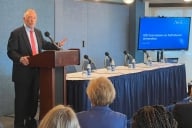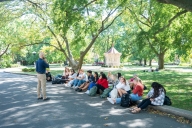You have /5 articles left.
Sign up for a free account or log in.
As calls for interfaith efforts on campuses have increased, so too have complaints from secular students who say they’re being left out of the conversation – complaints that at some institutions, fall on deaf ears. And even though more advocates of religious pluralism are coming forward on behalf of these students, and success stories of new groups on some campuses are inspiring others, many are still having trouble taking hold.
Particularly at religious colleges. Secular student groups at Baylor University, the University of Notre Dame and Duquesne University have been denied official recognition, even as organizations have sprouted up on a handful of other campuses (and at dozens of nonreligious colleges). Students say these groups are essential for providing a safe space to talk freely, but many activists and campus officials are urging colleges not to wait for students to form their own groups, and rather to reach out to them proactively.
Eboo Patel, founder of the Interfaith Youth Core, a Chicago-based organization that promotes pluralism on campuses (with and without religious affiliations), said as many as one in five students who work with his organization are nonreligious. More and more humanist students are choosing Roman Catholic, Lutheran and Methodist institutions, he said.
“They are clearly involved in interfaith cooperation not because they are religious themselves, but because they feel it is a part of their identities to build religious relationships with people of other identities,” Patel said. “They’re tired of having their choice and other religious choices maligned. I think they realize that it’s of a piece together, meaning that when you stand up for somebody else’s right to be religious, you’re standing up for your own right to choose none of the above.”
In a session at January’s annual meeting of the Association of Catholic Colleges and Universities in Washington, Patel urged faculty, staff and administrators to reach out to students of all faiths – and made a special point of including students of no faith, to the dismay of some in the audience. Across town that same week, at the annual meeting of the Association of American Colleges and Universities, Wofford College professor of religion Ron Robinson was on a panel explaining how he was doing just that.
Wofford, a small liberal arts college in South Carolina that is affiliated with the Methodist Church, is working under a grant to measure and improve religious pluralism on campus. Wofford asks about religious identity on its admissions applications, so it already knows that about 15 percent of its students check the “none” box, and fewer than 1 percent say they’re atheist.
But atheist students are likely far more prevalent on the campus than the numbers suggest, Robinson said, and has speculated as to why.
“There could be cultural concerns. People, when they’re 18, might be afraid in the South to identify that way,” said Robinson, who is also Wofford’s chaplain. When the college’s secular humanist atheist group first formed, there was resistance – from students much more so than faculty. While the situation has largely improved over the last few years, misgivings re-emerge from time to time among those who don’t get how a religious college could allow such a group to exist.
“It’s really an educational issue,” Robinson said. “I think what we’ve tried to say is that, you know, you get to think and believe as you wish. We will ask big questions and we will explore those with people of faith and with people of no faith – that’s part of what we do in the liberal arts. But you get to be who you are and you get to change who you are.”
So beyond just having their own group, the students are invited to campus events and discussions on religious pluralism. (Part of the problem with involving atheist students in this work is the language, Robinson and others said: The word “interfaith” by nature excludes nonbelievers.)
Robinson’s experience is typical, said Chris Stedman, the interfaith and community service fellow for the Humanist Chaplaincy at Harvard University. A former Christian who became atheist after wrestling with theology and his sexual orientation, Stedman has been interested in interfaith work since he became a student at Augsburg College, an affiliate of the Evangelical Lutheran Church. At Augsburg, Stedman realized that in conversations about interfaith engagement, atheists were absent. (Some Augsburg students began forming an "atheist, agnostic and secular humanist" group this year, however.) The lack of such a group when he was a student didn’t sit right with Stedman.
“The change has been so significant from when I first started to what I see now,” Stedman said. “This was basically unheard of a few years ago and now…. It’s become sort of a norm at this point that the atheist group would be sort of a catalyst for pushing for interfaith cooperation on a campuswide level.”
It’s easy to talk generally about big ideas of interfaith cooperation and religious pluralism, but how does that translate to actual engagement? At some colleges, it means bringing in speakers annually (or more often) to discuss secular approaches to life or examine issues through a humanist lens. At others, it means gathering students of different or no faiths for regular round table discussions in which they can relate to one another – for instance, one could ask a group of religiously diverse students how their faiths (or their system of ethics that they don't consider faith-based) speak to a given value, like mercy or compassion. Or, it could mean sending a group of students out on a big service project, a shared experience.
But it’s not always easy. There’s a suspicion among many officials at religious colleges that atheist or humanist organizations are seeking to cause trouble or “bash religion,” said Jesse Galef, communications director for the national Secular Student Alliance. That misconception, he said, that has led some colleges to bar the formation of such groups.
“While they have a legal right to do so, that doesn’t make it morally right,” Galef said. “The Secular Student Association groups are there to create a safe place for students to talk about their beliefs…. This seems like something every school could be able to get behind.”
Nonetheless, students occasionally run into trouble trying to create secular groups on religious campuses. At the University of Dayton, a Catholic institution, administrators shot down a proposal because “they were very uncomfortable” with the idea, said Nick Haynes, one of the students leading the group (which now meets off campus, without the funding that would come along with official university recognition).
Administrators initially rejected the group because it ran counter to the university’s mission to foster the development of faith, Haynes said. But since the group clarified that its own vision is to create a place where atheists and nonbelievers (and students of other faiths, too) can have a safe place to relate, the university’s stance hasn’t changed. It exemplifies the “divide” that Haynes sees on campus.
“There are a lot of groups for religious people, and if you talk to a lot of religious people on campus, oftentimes they can have some kind of discouraging things to say about nonbelievers,” Haynes said, noting that the same is true of the nonbelievers. “There’s this gulf, a lack of understanding between the two groups, and there’s no place on campus right now where those two groups get together and talk. There’s no community for nonreligious students.” (Dayton declined to comment beyond confirming that the university did not recognize the group, and adding, "We continue to work with and support these students in providing other opportunities and venues to foster dialogue and conversation about faith and reason." Dayton recognizes some non-Catholic religious groups, including the Muslim Student Association.)
Sometimes, Stedman said, that’s just the way it is.
“Of course it would be wonderful if the institution makes accommodations for those students, but at the same time, if Christian identity is central to what the school is about, I do wonder sometimes about what the particular challenges are of making space for other traditions in an environment like that,” Stedman said. “And I think they’re very different from schools that sort of say, ‘Religious diversity is just another aspect of the diversity that we value at this institution.’ That’s a very different kind of perspective than one that says, ‘This is an institution that is about a Christian identity, or whatever other identity.’ ”
Students at Duquesne University were also denied recognition because they were “not in line” with the institution’s mission statement, said Nick Shadowen, organizer of the (unofficial) Duquesne Secular Society. But in this case, it was the student government oversight committee calling the shots – a group composed of students. The conflict inspired students from neighboring colleges to protest in favor of the group.
Duquesne recognizes student groups like the Jewish Student Organization that celebrate other faiths. But a university spokeswoman said in a statement that the committee denied the secular students recognition because the group "does not comply with the university's mission and its positions oppose the existence of God."
Students at other religious institutions have been more successful.
At California Lutheran University, a small group had no problem forming a Secular Student Alliance – in fact, it’s been appreciated as highlighting a new level of diversity on the campus. The group, initially intended to be a place for a small group of nonbelievers to discuss religion and politics at a time when Proposition 8, the measure that banned gay marriage, and the presidential election were all over the national news, evolved into a safe place for nonreligious students on a religious campus.
“People came out, essentially, in our group, and they hadn’t come out to their roommates, their parents,” said Evan Clark, the former Cal Lutheran student body president who helped start the group. “We immediately gave them a sense of community.”
Especially when students reassess their faith in college, that community can be essential. A number of members of the Cal Lutheran group entered college with religious beliefs, but developed humanist leanings as students.
“I think the main thing about a college education is that you finally are outside of the community, and outside of your family that has been telling you what to believe – suddenly those authorities are removed and you’re in an educational setting that is challenging you to question and often you’re getting views or information that challenge what you were taught,” Clark said. “People suddenly have to start studying the history of the Bible, and that can be eye-opening because it usually doesn’t line up with what you were taught in Sunday school.”
The Cal Lutheran experience is more common than not, said Stedman, who hears weekly from people who genuinely want to involve atheists in interfaith work but don’t know how. (Tip: If they don’t already have a secular student group, help them form one. Then invite them to co-sponsor a humanist speaker. Not only does it send a welcoming message, it gives everyone a chance to work together.)
But, Stedman acknowledged, interfaith efforts still have a lot of ground to cover.
“I don’t think they’re happening enough,” he said, “or else I probably wouldn’t be pushing so much for them.”








